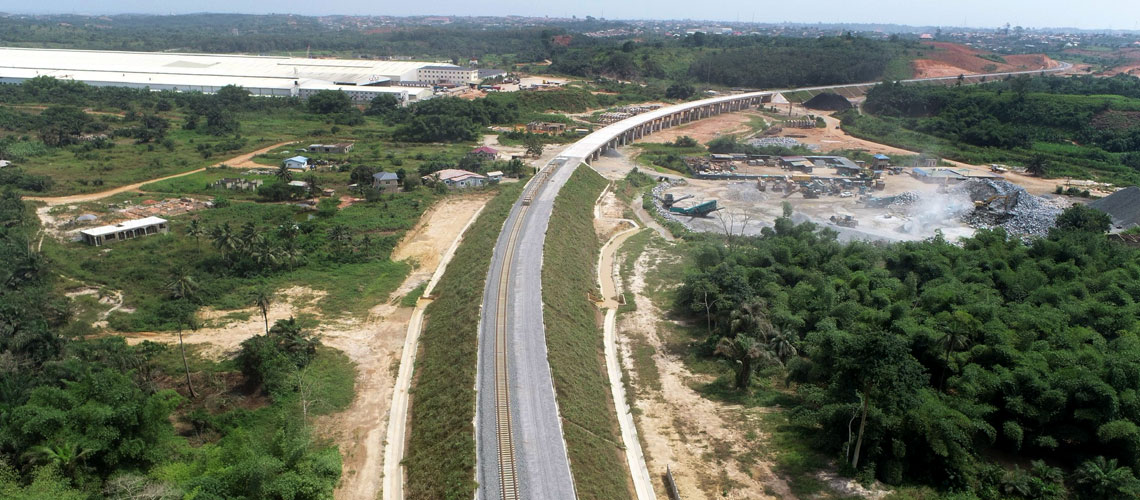
Published
- Sustainability
- Financing
Fast track to growth in Ghana
In Ghana, EKN-backed financing enables the biggest railway investment since independence. The project will boost exports, create new jobs and add to sustainability by shifting cargo from road to rail.
One of the fastest growing economies in Africa, Ghana has undertaken its single biggest railway investment since independence. The Western Railway line is key to the haulage of agricultural produce and minerals from the interior to Takoradi Port in the south.
The project is part of the country’s initiative to expand and develop its rail network infrastructure, updating the route to make it safer and faster while providing an alternative to less environmentally friendly modes of transport, such as haulage trucks and private cars.
Amandi Investment is the EPC contractor for the Western Railway Line, which is financed by two loans totalling 600 million euro in favour of Ghana’s Ministry of Finance. Deutsche Bank acts as mandated lead arranger (MLA) for both loans. The first 523-million-euro loan covers the bulk of the cost and is guaranteed by EKN and funded by Swedish Export Credit Corporation (SEK) and arranged by Deutsche Bank. The second is a 75-million-euro commercial loan to cover the down-payment on the EKN-backed financing, which was arranged by Investec bank ltd. DNV, an accredited certifier with the Climate Bonds Standard, has classified it as a Sustainable Loan, which testifies to project’s ESG impact. Bluebird Finance & Projects acted as the lead financial advisor to the EPC.
The involvement of EKN and SEK reflects the significant number of Swedish sub-suppliers participating in the project, and the agencies’ backing helps secure a highly favourable borrowing rate. Malin Tegnér Larsen, Senior Underwriter at EKN comments, “EKN's mission is to enable financing of the purchase of Swedish high-quality service and equipment. It is particularly rewarding that EKN has participated in this important project.”
In addition, a sizable share of the content is supplied by Swiss companies, which has allowed EKN to reinsure close to 49 per cent of its risk at SERV, Switzerland’s ECA. “This is a great way to participate in projects where the total Swedish content falls short of the 30 per cent share required by our statutes,” concludes Tegnér Larsen.
Highly favourable borrowing rate
Most of the Swedish suppliers are contracted and coordinated by trading house Elof Hansson and integrator specialist XLIT. Swedish deliveries include construction equipment from VCE, signalling systems from Alstom and railway cars from Kiruna Wagon-Lit. The construction of the railway is managed by XLIT in partnership with Scandinavian Track Group, STG, who also engage and manage local labour.
“EKN and SEK are instrumental in securing a highly favourable borrowing rate that makes it possible to source high-quality products and services in the project,” says Fredrik Agerhem at XLIT, who believes the project is highly beneficial for the country. “It’s an important milestone in Ghana’s economic growth story, creating jobs and providing sustainable transport of agricultural products, minerals and passengers for decades to come.”
Agerhem points out that a lack of modern infrastructure creates bottlenecks in many African countries. “When development does not keep up with demand, people and businesses are barred from realising their opportunities. This is a productivity-boosting project for the Ghanaian economy that enables increased exports, which in turn secures increased tax and customs revenues for the government. With railroad infrastructure in place, the incentive for companies to invest in new production facilities grows and the perceived risk is diminished.”
Commenting on XLIT’s role as coordinator, he adds: “As subcontractor integrator we coordinate several suppliers and enable a timely execution. It’s imperative that new infrastructure projects adhere to rigorous standards of modern procurement practices to ensure value for money, while attaining and maintaining the highest standards of the ESG issues.”
At Deutsche Bank, Werner Schmidt, Global Head of Deutsche Bank’s Structured Trade & Export Finance, concludes that, “The loan is structured with a strong focus on international environmental and social standards. It will help strengthen Ghana’s economic growth by increasing both freight and passenger connectivity between the different regions in the country and enable transportation of different mineral deposits.”
